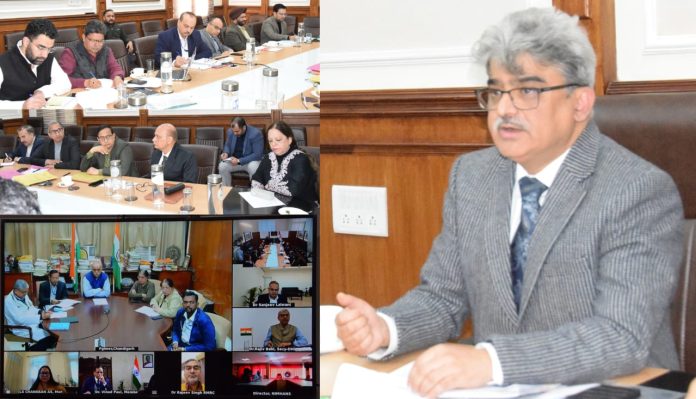JAMMU: In response to the recent unnatural deaths at Badhal village, District Rajouri, Jammu and Kashmir, the Government of Jammu and Kashmir has taken actions to address the situation.
The Ministry of Home Affairs, Government of India, is monitoring the situation and had earlier sent a multi-departmental committee to Badhal, Rajouri to assess and assist the J&K team in tackling the crisis. At the request of the Jammu and Kashmir Government, Dr. V.K. Paul, Member, NITI Aayog, chaired a meeting to bring together national and local expertise for resolution. The focus of the meeting was to review the ongoing management strategy, identify the root cause of the deaths, and devise measures to prevent further fatalities.
The meeting, led by Dr. Paul, included officials and experts. The participants were Atal Dulloo, Chief Secretary, J&K; PunyaSalila Srivastava, Secretary Health & Family Welfare, Government of India; L. S. Changsan, Additional Secretary Health & Family Welfare, Government of India; Dr. Syed Abid Rasheed Shah, Secretary Health & Medical Education Department, J&K; Prof. (Dr.) M. Srinivas, Director of AIIMS, New Delhi; Dr. Rajiv Bahl, Director General of the Indian Council of Medical Research, New Delhi; Prof. (Dr.) AtulGoel, Director of the National Centre for Disease Control, New Delhi; Prof. (Dr.) VivekLal, Director of PGIMER, Chandigarh; Dr. Bhaskar Narayan, Director of CSIR-IITR, Lucknow; Dr. Surkhminder Kaur, Director of the Central Forensic Science Laboratory, Ministry of Home Affairs, Chandigarh; Dr. AtulGoel, Director General of Health Services (DGHS), New Delhi; Dr. Pratima Murthy, Director of NIMHANS, New Delhi; and Director MHA (JKL).
The technical experts included eminent scientists in the fields of Toxicology, Microbiology, Medicine, Virology, Genetics, Epidemiology, Forensic Medicine, Neurology, Pathology, Pediatrics, Pharmacology, and Immunology. These specialists brought their expertise to the discussion to ensure a multi-disciplinary approach to understanding and addressing the crisis. On the basis of different lab reports available and thread bare discussion among technical experts, it was clearly brought out that there is no infectious/communicable cause (either viral or bacterial).
The meeting emphasized that the primary focus of the government is to prevent any further incidents, review the ongoing management strategy, identify the root cause of the deaths, and devise strategies to prevent further fatalities. Dr. Syed Abid Rasheed Shah provided a presentation on the sequence of events leading to the unnatural deaths.
Following elaborate deliberations, several decisions were made, including the establishment of a control room as a centralized point for decision-making and coordination to ensure swift responses to the crisis. Technical and national-level taskforces will be formed, involving experts from national and local institutions to analyze the situation, evaluate reports, and provide recommendations. These taskforces will meet regularly and develop a checklist to ensure a coordinated field response while improving Standard Operating Procedures (SOPs).
The government will also launch a community awareness campaign in the affected areas to educate the local population on health safety measures and minimize potential health risks. A death audit will be conducted to ascertain the sequence of events and root causes of the fatalities. Additionally, clinical care teams will be stationed in Rajouri with support from institutions like AIIMS and PGIMER for timely intervention.
The Ministry of Home Affairs and the Government of Jammu and Kashmir reaffirm their commitment to addressing this crisis collaboratively, combining national expertise with local resources to safeguard public health in the region.


